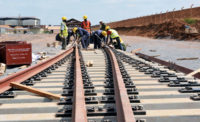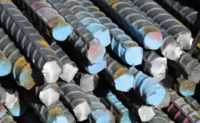In Africa, Donald Trump’s “Make America Great Again” mantra was understood to mean that his administration would adopt a posture based on protectionism and isolationism. If this proves to be the case, it is unlikely to impact Africa’s engineering and construction industry, say analysts. American disengagement will only increase China’s involvement in the continent’s infrastructure development in the medium and long term, they add.
“There is a likelihood we will see more protectionism on the part the U.S.,” which will lead “to less flow of investments into most regions, including Africa,” said Graham D. Robinson of Global Construction Perspectives, a London-based global construction and engineering industry analyst.
He said that, although it is not yet clear what policies the Trump presidency will adopt concerning U.S. investments in emerging markets, “the U.S. is not a big investor in Africa’s construction and engineering industry, [so] there is likely to be minimal effect [under] Trump.”
Robinson said the main investors in Africa’s engineering and construction industry are China, Italy and Europe, especially Italy, France and the U.K.
“China investments continue to dominate Africa’s engineering and construction sector, followed by western Europe and India,” Robinson said. The infrastructure market in sub-Saharan Africa is expected to grow by 110% through 2030, “which is a huge growth compared to other regions in the world,” he said.
“U.S. involvement in Africa’s engineering and construction industry has been minimal mainly because previous administrations considered Africa as a small market and not an important destination for investment,” Robinson observed.
Robinson said two other events will have a greater effect on Africa’s infrastructure growth momentum: the resignation of Italian Prime Minister Matteo Renzi, whose referendum on constitutional reform went down to a surprising but decisive defeat, and the United Kingdom's impending exit from the European Union.
“The fragmentation of Europe is probably what can be seen as a threat to Africa’s foreign direct investment,” said Robinson.
Chelsea Markowitz, from the Economic Diplomacy Programme at the Johannesburg-based South African Institute of International Affairs, agrees, saying, “Trump’s presidency will not majorly affect the African engineering and construction sector. American foreign direct investment in engineering and construction in Africa is not as prominent as that from other regions, such as Europe … China and South Africa,” she said.
In an email response, Markowitz said the focus of U.S. foreign direct investment (FDI) in Africa is primarily in resources, manufacturing and services, such as finance.
“The Trump presidency is not very likely to have a major impact on most U.S. foreign investment in other countries because foreign investment is not necessarily the focus of his isolationism but, rather, the outsourcing of American manufacturing jobs to other countries—this would be the type of FDI which would be most controversial,” said Markowitz.
Africa’s infrastructure investments are likely to be impacted by other issues, such as policy and regulatory certainty and economic conditions, rather than who is the U.S. president, according to Markowitz.
However, President Obama’s “Power Africa” initiative, which seeks to mobilize technical and legal experts, the private sector, and governments across the globe to partner in generating 30,000 MW of cleaner power generation and have at least 60 million new electricity connections in Africa, could be a victim of Trump’s protectionist and isolationist policies.
“Given that Power Africa is an aid program, it is more likely that Trump could negatively impact the future of this program, which does involve drawing in American private investors,” said Markowitz.
She said the few major American engineering and construction companies that are operating on the continent, such as the Kansas City, Mo.-based Black & Veatch, are not likely to make any drastic changes in their approach and operations under the Trump administration.
Bechtel Corp.’s Adi Raval said it is too early to say what impact Trump’s presidency will have on Africa’s engineering and construction industry because, at the moment, there are “lots of balls up in the air.”
Should Trump’s policies lead to reduced investment in infrastructure in emerging markets, it may benefit China, according to Anil Bhandari, president of Nairobi-based AB International Enterprises LLC and former World Bank adviser on infrastructure. “Any reduction in whatever small investment the U.S. is making in Africa’s construction industry will embolden China, which already has a huge share of the continent’s infrastructure development market,” he said. According to Markowitz, although China’s role in Africa’s infrastructure development might well increase over time, Chinese authorities are keen to relieve the Asian economic giant of excess industrial capacity by engaging in engineering and construction in African countries, where there is more demand, according to Markowitz.
“This helps to relieve balance-of-payment issues so that China can sell consumer goods to Africa,” Markowitz said. “China’s growing prominence in infrastructure development in Africa will continue, with America taking a backseat, but I don’t think that Trump’s presidency is or will be the main reason for this trend,” she argued.


